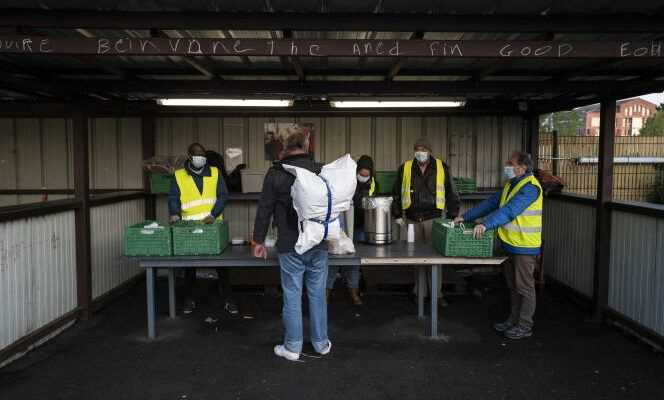Containment and the pandemic have indeed caused an additional budgetary shock among the poorest families, as measured by Secours Catholique in its 2020 annual report, published this Thursday, November 18: 30% of them have suffered loss of income and 60% saw their expenses, for example of school canteen, increase.
The volunteers of this charity have, during the year, met and helped 777,000 people, nearly half of them children, and its report allows a startling dive into the world of poverty in France: it affects first of all single-parent families (29%), therefore children, and foreigners whose share continues to increase, to 46%, ten points more than in 2015 – among them, a third are undocumented, another in demand of regularization and the third in order.
The situation of people helped by Secours Catholique is deteriorating: 46% face unpaid debts, in particular rent, with an increase in debt, of 777 euros on average in 2020, against 756 euros in 2019; nearly a third of them do not have stable housing, which is again ten points more than in 2010 – an increase certainly linked to the strong presence of foreigners who have more difficulty finding housing, but not only.
The effectiveness of measures taken during the pandemic
The finding contrasts, at first glance, with data from INSEE, in its advanced estimate for the year 2020, published on November 5, which observes that the monetary poverty rate remained stable in 2020, compared to 2019, 14.6% of the population with an income below the poverty line (set at 60% of the median income). Thus, 9.5 million people live on less than 1,102 euros per month and per unit of consumption. The support measures taken by the government during the pandemic, such as part-work compensation, aid for self-employed workers and exceptional measures for the poorest, beneficiaries of RSA and social minima (150 euros plus 100 euros per child dependent, in May and November 2020) allowed this stability.
“These measures have been effective and so much the better, welcomes Véronique Devise, president of Secours Catholique. But we receive the poorest people, many of whom go under INSEE radars, especially students and so-called households “not ordinary”, homeless and accommodated in collective structures. Furthermore, INSEE only records declared, formal income, and does not see the charges, in particular energy and food, which have increased significantly. “ INSEE agrees, and specifies, in the conclusion of its note: “It is possible that the health crisis had a more marked effect for some of the most vulnerable people, poorly captured by our surveys”.
You have 31.14% of this article to read. The rest is for subscribers only.
